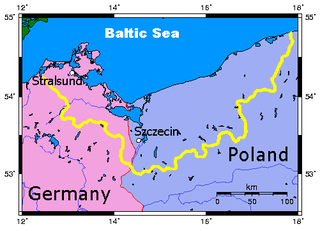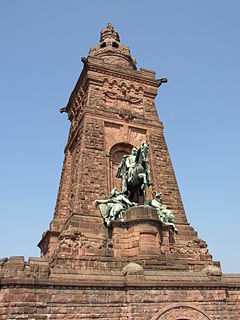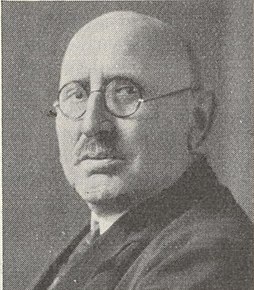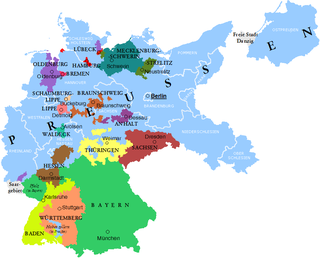
Deutscher Kriegerbund (English : German Warrior League) was a war veterans' and reservists' association in Germany established in April 1873 in Weißenfels.

English is a West Germanic language that was first spoken in early medieval England and eventually became a global lingua franca. It is named after the Angles, one of the Germanic tribes that migrated to the area of Great Britain that later took their name, as England. Both names derive from Anglia, a peninsula in the Baltic Sea. The language is closely related to Frisian and Low Saxon, and its vocabulary has been significantly influenced by other Germanic languages, particularly Norse, and to a greater extent by Latin and French.

A veteran is a person who has had long service or experience in a particular occupation or field. A military veteran is a person who has served and is no longer serving in the armed forces. Those veterans that have had direct exposure to acts of military conflict may also be referred to as war veterans. A combat veteran is a person who has fought in combat during a war or a skirmish against a declared enemy and may still be serving in the military.

A reservist is a person who is a member of a military reserve force. They are otherwise civilians, and in peacetime have careers outside the military. Reservists usually go for training on an annual basis to refresh their skills. This person is usually a former active-duty member of the armed forces, and they remain a reservist either voluntarily, or by obligation. In some countries such as Israel, Norway, Singapore, and Switzerland, reservists are conscripted soldiers who are called up for training and service when necessary.
Contents
Its origins lie in a Warrior Association established in 1786 by fusiliers of Frederick II of Prussia's army in Wangerin/Pomerania. The original purpose of the war veterans' associations was to provide their members and former soldiers with proper burial arrangements. Former soldiers felt the need of commemorative tombs that would preserve the dignity of their former comrades-in-arms and honor them even after their death. This type of association received a considerable boost after Prussia's victorious battles against the Danish (1864), Austrian (1866) and French armies in 1871.

Fusilier is a name given to various kinds of soldiers; its meaning depends on the historical context. While fusilier is derived from the 17th-century French word fusil – meaning a type of flintlock musket – the term has been used in contrasting ways in different countries and at different times, including soldiers guarding artillery, various elite units, ordinary line infantry and other uses.

Węgorzyno is a town in Łobez County, West Pomeranian Voivodeship, Poland, located on Lake Węgorzyno. It is the seat of Gmina Węgorzyno. As of 2009 it had a population of 3021 people. It is a retail and leisure resort.

Pomerania is a historical region on the southern shore of the Baltic Sea in Central Europe, split between Germany and Poland.
A number of these veterans' associations established the Deutscher Kriegerbund by joining efforts for a common cause in 1873. In April 1897, the Deutscher Kriegerbund became the Prussian Country's Warrior League (German : Preußischer Landeskriegerverband). Its former name Deutscher Kriegerbund was kept for certain economic and social dealings. In this form, it was a forerunner of later German military social welfare provisions like the National Socialist War Victim's Care. Since it was initially dominated by groups of soldiers of the former Prussian army, local veterans' associations of Bavaria, Saxony, Württemberg, Hessen and Baden preferred to remain out of its circle. The Deutscher Kriegerbund began the efforts to build a memorial that would honor and represent the German warriors in 1888.

German is a West Germanic language that is mainly spoken in Central Europe. It is the most widely spoken and official or co-official language in Germany, Austria, Switzerland, South Tyrol (Italy), the German-speaking Community of Belgium, and Liechtenstein. It is also one of the three official languages of Luxembourg and a co-official language in the Opole Voivodeship in Poland. The languages which are most similar to German are the other members of the West Germanic language branch: Afrikaans, Dutch, English, the Frisian languages, Low German/Low Saxon, Luxembourgish, and Yiddish. There are also strong similarities in vocabulary with Danish, Norwegian and Swedish, although those belong to the North Germanic group. German is the second most widely spoken Germanic language, after English.

The National Socialist War Victim's Care was a social welfare organization for seriously wounded veterans as well as frontline fighters of World War I. The NSKOV was established in 1934 and was affiliated to the Nazi Party.

Bavaria, officially the Free State of Bavaria, is a landlocked federal state of Germany, occupying its southeastern corner. With an area of 70,550.19 square kilometres, Bavaria is the largest German state by land area comprising roughly a fifth of the total land area of Germany. With 13 million inhabitants, it is Germany's second-most-populous state after North Rhine-Westphalia. Bavaria's main cities are Munich and Nuremberg.
This monument, located on top of the 473 m high Kyffhäuser mountain, was finally inaugurated on 16 June 1896. The building of the memorial pleased and inspired the other German war veterans' associations who had been reluctant to join the Deutscher Kriegerbund. As a result of this change of attitude, the steps to form a wider organization were taken in 1900 and the Kyffhäuserbund was formed. This inclusive organization integrated the formerly scattered German war veterans' associations, which had been one of the main aims of the Deutscher Kriegerbund.

The Kyffhäuser Monument, also known as Barbarossa Monument (Barbarossadenkmal), is an Emperor William monument within the Kyffhäuser mountain range in the German state of Thuringia. It was erected in 1890–96 at the site of medieval Kyffhausen Castle near Bad Frankenhausen.

The Kyffhäuserbund is an umbrella organization for war veterans' and reservists' associations in Germany based in Rüdesheim am Rhein. It owes its name to the Kyffhäuser Monument, a memorial built on the summit of the 473 m high Kyffhäuser mountain near Bad Frankenhausen in the state of Thuringia in central Germany.











